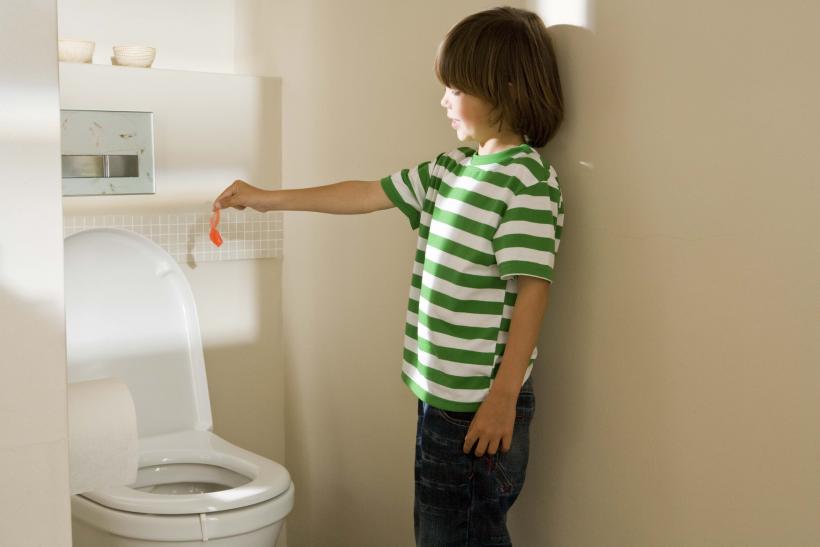
There I was throwing a loaded idea — heaven — at my son. What I should have said was, "I don’t know." But saying that out loud terrified me.
The dead Goldfish swirled in the toilet bowl, circling the inevitable. My 4-year-old, watching the burial at sea, innocently inquired, "Mommy, where is Charlie going?"
Without hesitating, I blurted, "Charlie's in heaven now."
I couldn't believe the words had slipped out of my mouth so easily. During my pregnancy, I had decided that I was going to raise my son to be “spiritually open” without any specific religious ideology. This philosophy came from my desire for him to have a personal journey. It also came from the fact that at age four, I already felt that I would be locked out of heaven for coveting Stephanie Mcnelly’s Cabbage Patch doll, Renee. Cherubic Renee’s authentic birth certificate seared my mind nightly as I twisted with guilt, clutching my knock-off version, Franny, the lettuce patch girl.
As a child raised in a strict religion, I swore my children’s only moral code would be love to all mankind. We’d sing songs about butterflies, stardust, and the bell of freedom. My tiny citizens of the world would be equally versed in Atheism, Buddhism, and that one where you spin around in white robes. We would have lively discussions on the pros and cons of Shinto while we made sushi together.
But there I was throwing a loaded idea — heaven — at my son. What I should have said was, "I don’t know." But saying that out loud terrified me.
Wasn’t a goldfish sitting on a puffy cloud a far more satisfying scenario? The idea of raising a child to be “open,” while appealing, is not without challenges. Here are some questions I had to grapple with when deciding how to teach my child about spirituality.
1. Where Do We Go When We Die?
This is the biggest challenge for me, as children are exposed to death — sometimes very early. I want to use the idea of heaven to comfort. I worry that if I say “I don’t know” my child will spin out and start abusing Baby Tylenol because he can’t possibly handle any unknowns in his tiny black-and-white brain.
This is based on my belief in his need for concrete answers. “Why can’t I eat this entire bag of candy?” cannot be answered with: “Well, people believe a lot of things about sugar. Some believe sugar causes cancer. Some believe sugar is the only way to make the medicine go down. But either way, it’s important to decide what you believe about sugar so you can be authentic on your sugar journey” because he’ll immediately eat the entire bag of candy.
But are children really terrified of things they don’t know? After all, everything is unknown at this age: how to drive a car, electricity, why you don’t have three ears. Why not let them lead the conversation?
Anne Marshall, (raised Mormon, now Agnostic), decided to put the question back to her young son. According to Anne, “When he asked me what happens when we die, I told him I didn’t know and asked him what he thought."
You Might Also Like: To The Doctor Who Said "God Bless You"
“I think we turn into something else. Maybe a fairy,” he surmised. I like this idea that “I don’t know” doesn’t have to be scary. I want to look forward to discovering unknowns without fear just like this boy.
2. Are We Really Teaching "Openness" If We Strongly Disagree With A Religion?
Another item that gives me that kind of distress you get when you realize that you have melted all of your makeup brushes in a hot pot is that there are many religions that teach things I feel are wrong. Do I need to be okay with a religion that teaches a woman will burn in hell if she doesn’t save herself for her husband?
I always thought I’d tell my children, “Well that’s their experience and we need to respect that we all have differences.” Then we’d flash each other the peace sign before braiding each other’s hair. But one thing that happened when I gave birth was a sense that I can’t sit idly by while things are happening in the world.
Mandy Steinberg, (raised Evangelical, now Athiest) put it best on the topic: “I don't think my child should be "open" to things like homophobia, sexism, ableism, or racism. I think we have this idea that being 'open-minded' means we have to be okay with EVERYTHING. But that's just not true. Some things are not okay. I believe teaching my daughter boundaries will be important to her as well. Love everyone, sure, but if someone believes you are less than them, or that they can harm you or discriminate against you or your family or other people, well, that's a boundary and you do not have to allow it. It is okay to call out bad behavior and to have a voice. Those are values I want to instill in my child.”
3. Is Knowing About All Religions and Philosophies Necessary To Choose One?
Part of growing up in a strict religion that I don’t agree with was the lack of education on other faiths. Sure, it was mentioned that we should respect all religions, but simultaneously there were plenty of tales where a white missionary had been tied to a stake and burned by “savages” who accessorized with the bones of their Puritanical victims. I wanted to make sure that my children were taught to respect all religions and be well versed in all choices available.
But, here’s the thing. My son just wants to read books about race cars. If I force him to choose a children’s book about the ancient Mayans, aren’t I indoctrinating him in my own way? Do we need to know everything on the menu to make an educated choice? If I have never tried organic, rainbow carrots, then am I going down the wrong path with brussel sprouts?
It is our job to say, “yay, you took your first step!” not “here are all the ways you can take a step. I have a few books on each of them and am here to discuss the merits of each.”
4. Can Children Feel Safe If Their Parent Doesn't Know The Answers?
The heart of these challenges is the idea that as a parent, I am supposed to teach my child all the tools he needs for life. If I am teaching them to live without religion, then I better know what I’m doing! I genuinely fear my child’s look of panic when he realizes his mother is a neurotic bundle of questions, not a sage-like beauty who he will mention as the “rudder to his ship” in his wedding speech, but I digress.
The topic of raising kids without religion taps into our key fear as parents. Is it okay to not know what you’re doing or how it will turn out? That is the essence of spirituality and parenting. We don’t know what we’re doing or how it will turn out. But we can look to the sky and shout “I don’t know” with our children with the excitement of a fellow traveler on this road into the great wide open.








